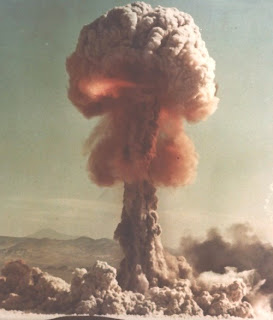Most Americans seemed to assume the Principle of Impunity throughout the 1990's, but then on September 11, 2001 we had a rude awakening which put the principle in doubt. It turned out that they could zap us in a very big way.
But now twelve years later Americans have probably gone back to assuming that the Principle of Impunity is valid. Now that we have tightened up our airline security, there's no more risk that our enemies could hit us again with another 9-11 type attack, right?
Wrong.
The fact is that since at least the 1990's there has been a huge danger of an attack much worse than the 9-11 attack, and in the years since 2001 we have done very little to reduce the risk of this attack. The type of attack I refer to is an attack with a small nuclear weapon, either a device taken or obtained from a foreign power, or a device constructed from a small amount of highly enriched uranium, through a method that is easy to accomplish once the highly enriched uranium has been obtained.
An atomic bomb is made from either plutonium or highly enriched uranium. It is very hard to make either of these nuclear materials, but in previous decades the world went overboard in making gigantic amounts of both of these materials. The world has some 17,000 nuclear weapons, but outside of those weapons is enough nuclear material (plutonium and highly enriched uranium) to make at least 40,000 additional nuclear bombs. This material is scattered all over the world in many different nations. In some of these places this material is stored very securely. In other places it is not stored very securely. Supposedly there are quite a few places in Russia where nuclear materials are secured merely with a chain link fence, a padlock, and a seedy underpaid security guard.
If a terrorist gets plutonium, it is still very hard to make a nuclear bomb from it. But if a terrorist gets highly enriched uranium, it is quite easy to make a nuclear bomb. You can use a very common 19th century technology to make a nuclear bomb from highly enriched uranium.
So the fact is that throughout the past twenty years the United States has been vulnerable to a terrorist nuclear attack. To carry out such an attack, terrorists would need to merely acquire a softball-sized amount of highly enriched uranium, and there are thousands of such softballs scattered all over the world. The terrorists would also need to smuggle this small object into the US, but since drug smugglers smuggle tons of forbidden goods into our country every week, smuggling in nuclear material would not be very difficult. Thousands of shipping containers are moved into the US every day, and only a small fraction of these are checked.
Now the risk of nuclear terrorism is old news, but how is it relevant to the situation in Syria?
The relevance is as follows:
- There is a significant possibility that enemies of the United
States have already smuggled into our country a nuclear device. They
may be waiting for some suitable opportunity to explode the device.
A high-profile military action by the US against Syria might give
them such an opportunity. Anyone holding such a device might think
that the world outcry against the use of such a device would be
smaller if it occurred just after the world had watched a heavy
bombing attack by the United States.
- President Bashar al-Assad could easily have in his possession
a supply of highly enriched uranium. If he faces heavy bombing from
the United States, he might well release some of that nuclear
material to terrorists, thinking that it will eventually be used
against the United States. If it seems too far-fetched that this
leader could take an action that might lead to a nuclear bomb
exploding in a US city, one should merely consider that apparently
Bashar al-Assad recently ordered a chemical attack that killed more
than a thousand of his own citizens. Anyone who could do that might
also take an action leading to a nuclear explosion in a country that
was bombing his country.
It is therefore entirely possible that a US bombing campaign against Syria might lead to a nuclear explosion in an American city.
I despise all wars and all bombings, and I also loathe it when any culture glamorizes war and war-makers, because when we do that we sow the seeds of future wars. Starting a war is playing with fire. One never knows where the fire will spread. When Gavrilo Princip assassinated the Archduke Franz Ferdinand in 1914, he was probably thinking, “I'll just kill this one guy, and that will be the end of it.” The assassination started a war which killed nine million combatants, and probably caused a flu epidemic that killed some fifty million other people.
Who knows what evils may flow from an escalation of a war in Syria. I pray that the evil I have mentioned here does not come to pass.


No comments:
Post a Comment